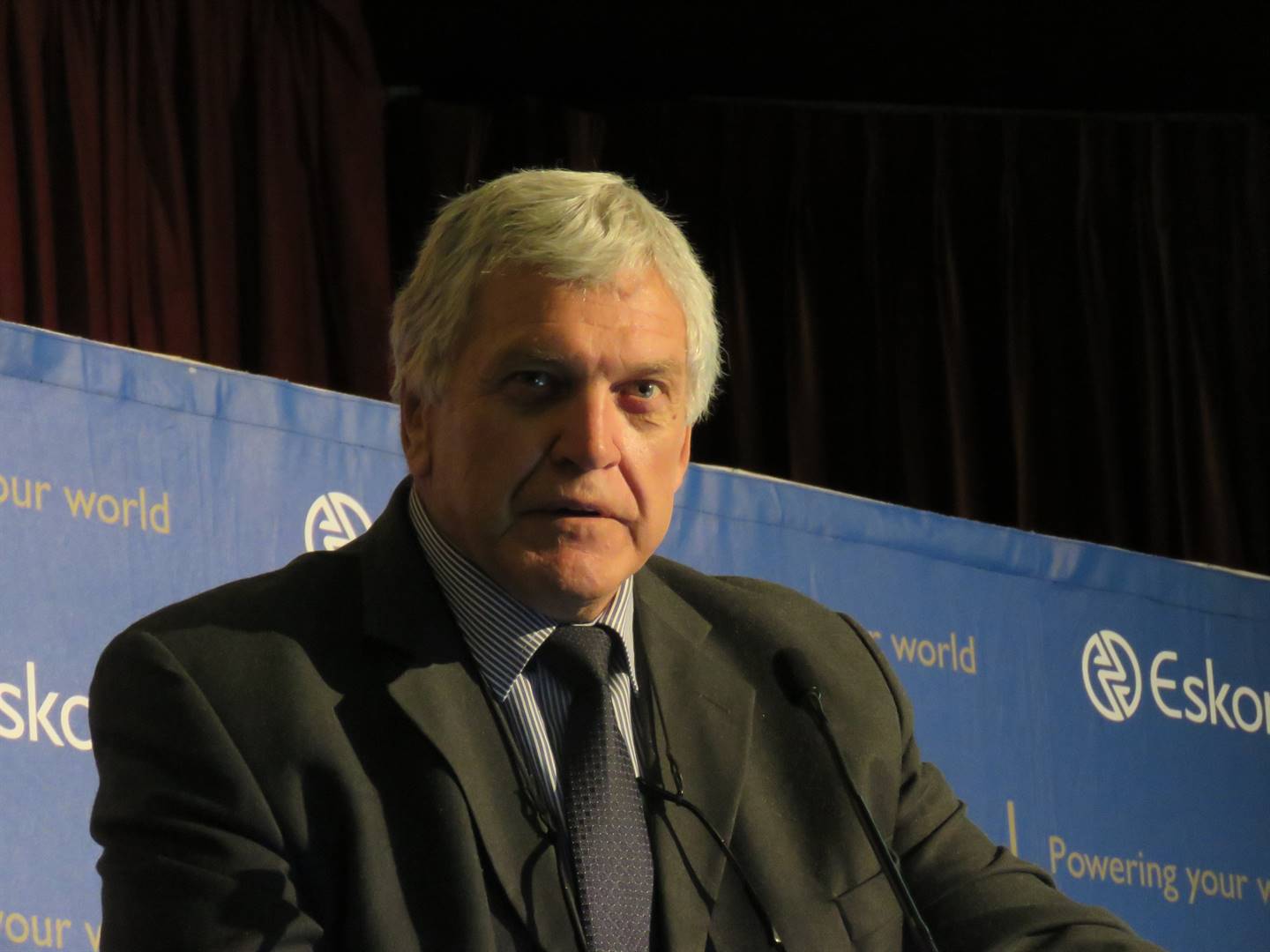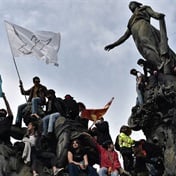
“I know that you’re very angry. You ought to be. We are the brake preventing the country from moving forward. Who would want to come and invest here, with Stage 6 loadshedding?”
If there is one person who knows just how fed up South Africans are with Eskom, it’s Jan Oberholzer, this prince of darkness.
In the mist of one of the grimmest moments in Eskom’s history (there aren’t even six stages of grief, somebody tweets), Eskom’s chief operations officer was the face of the crisis.
The one who had to take the blows.
“Everything that could go wrong at Eskom on Monday, went wrong. It was a perfect storm. But that’s not what the world wants to hear. The thought people get stuck with is: Loadshedding Stage 6. People forget that for 340 days of the year there was power.
Stage 6 is the last thing you need. You’re busy failing the country. You’re failing 55 million people. That’s how you feel. And you know people are saying, ag, you lie about this and that.
You don’t trust us. I do understand that, maybe things were said in the past that weren’t the truth.
He becomes almost emotional.
“My father, a former Eskom employee, taught me there’s something you never get back if you throw it away: your word. Your integrity. So. What you get from my mouth is the truth. And if anyone tries to tell me to say this or say that, I will not say it. I assure you that what I’m sharing with the country here is the absolute truth.”
In his voice, you hear Stage 6 desperation.
He’s already grey, this engineer, but on Monday he turned completely white, he jokes.
He talks about the day’s events as if he’s describing an accident.
That morning, shortly after four, he went to work with an empty feeling in his stomach.
“We knew that the week might give us problems, but we thought Stage 2, maybe a little bit higher, but six was not on anybody’s mind.
“Throughout the morning I was relatively uncomfortable with the loss of additional units during the night. And then Medupi happened. Medupi is a construction site and one cable had already been damaged during construction. With the rain in the cable ditch we then lost the power supply. I was on the phone to Medupi the whole time, and at a certain point I told myself to keep quiet now, Jan, you’re making these guys anxious and they might begin to do other things wrong.”
Let me make it clear, said Oberholzer: “The main cause of the loadshedding was not sabotage or rain or whatever. After 12 years of neglecting our power stations, our system is unpredictable and unreliable. I’m not talking about putting on a band aid, I mean that real, deep maintenance is required.
“And then on top of that the Good Lord sent us rain. At more than ten units unplanned interruptions led to the first loadshedding. Five of them were as a result of boiler leaks, which take between four to six days to repair.
“Now you must know: Camden, Tutuka and Kendal all had flooding. We got 180mm within a short period of time in Camden (Ermelo), there were swimming pools in the power stations, the drainage was too slow.
“And then, critically, the Kriel open cast mine flooded completely in the area where conveyor belts bring coal to the power station. Not even a kilogram of coal was getting out of there, and we had to turn off two of the six units. And because there wasn’t any coal, we had to bring down the capacity of the four units from 500 to 200 megawatt per unit. Say goodbye to 1 400 megawatts.
In addition, as everyone knows, rain and Gupta-grade coal is a recipe for loadshedding.
“People are now saying, aha, Oberholzer, you said you were preparing for rain. Let me tell you right now: if we hadn’t done that this would have been a total catastrophe.”
After the previous wet coal fiasco, Eskom began compacting coal stocks at certain strategic locations. During rainy weather, the outside layer can be scraped of, then you reach dry coal.
This time the dry coal got wet immediately, so it was very challenging.”
On top of that, at Medupi, two electric cables that supply the conveyor belts with electricity failed.
“So then we also partially lost Medupi because, just like at Kriel, you have to turn units off if there is no coal supply. Two units were turned off and the others were scaled down.”
By lunchtime it became clear that Eskom’s emergency water and diesel stocks were going to run out.
“We had already begun using a lot of diesel to supplement the power supply at that stage. And that’s how we hit stage six. A perfect storm.”
Oberholzer wishes the public could have been with them in the Eskom operations room on Monday.
“People think we accept things like these, that we just take it easy peasy. But you won’t believe the emotional impact it has on our leadership corps when we are unable to carry out our mandate.
“I saw tears in peoples’ eyes when we said: Stage 6 loadshedding. I promise you, tears. I’m getting emotional just talking about it.
“To have to tell (Public Enterprises) minister Pravin Gordhan and the chairperson (Jabu Mabuza) that South Africa is now entering stage six loadshedding was a very, very low point in my life.
The Oberholzers are Eskom people.
“Full Eskommers,” he says, with a touch of pride in his voice.
“I grew up in an Eskom house in Witbank, where my mom still lives, and no, she doesn’t have a generator,” he says laughingly.
“I got my engineering degree with an Eskom bursary, and worked at the old Eskom for a quarter of a century. Then I left for ten years, for reasons that I don’t want to expand on. And now I’m back, during this terrible dilemma.
“It doesn’t help to blame others for what happened in the past. I ask myself: why have we moved away from methods and recipes over the past ten years that have been successful for decades? It’s not difficult to answer that question: Eskom is captured. That’s all. It’s hard to find the right words. Since returning, I’ve realised that greed is an untreatable disease. I’m now working with the Special Investigative Unit. The capture runs right through the entire organisation, not just the leadership. It also doesn’t help when you work with unethical contractors and suppliers. It’s a cancer, and you have to cut it out.”
And the suspicions about Hitachi Power Africa, which had an ANC-controlled black empowerment partner?
“I also don’t want to comment on that. We work hard on our relationship with Mitsubishi, which took Hitachi over. And I have to admit, the Japanese do their part when it comes to saving the situation at Medupi and Kusile.”
What is urgently needed is more power from somewhere, so Eskom can really repair its battered, middle-aged power stations.
“Assume the country need 30 000 megawatts. If Eskom only has to deliver 25 000 megawatts 24/7, 365, the shortage of 5 000 megawatts has to be supplemented. There are independent providers who can help.”
Eskom’s presentation on this will hopefully be discussed by cabinet on Friday.
“I believe that we’ll see action soon.”
On January 3, the design adjustments at Medupi’s unit three will begin.
After 75 days, if everything is implemented, they will tackle the other units and eventually the “silent” Kusile.
And yes, there was sabotage.
Even if nobody believes Eskom after Alec Erwin’s bolt-in-the-Koeberg-reactor.
“In the week before Monday, we lost ten units as a result of unplanned breakdowns, of which two units were the sabotaged Tutuka unit. The sabotage did not take us to six, but it was part of the run-up. There have been various incidents like this. I can’t say anything further, a case was opened with the SAPS.”
So, if this happens so often, why doesn’t Eskom have cameras at the power stations?
He is expecting the question.
“We do. And we’re also doing other things now, also at transmission lines. But it’s difficult monitoring something like this completely.”
Oberholzer does not agree with Finance Minister Tito Mboweni that Eskom should be partially privatised.
“Eskom has to become three well-run organisations again: distribution, transmission and generation. That’s where most of the decision-making has to take place, not in head office. After my return 16 months ago, the response shocked me so deeply when something went wrong and I asked people what had failed: ‘Ask head office’. And head office just says, we didn’t know. Where is the accountability? Within my first two weeks I had to act as the CEO, with loadshedding and strikes at the same time. It was a totally new Eskom, with a new culture. What a reality check.”
South Africa has to adjust to the energy industry, which is changing radically worldwide.
“But I think we have to first find a sustainable fix for what is broken at Eskom.”
Jan and his wife Lindy’s middle son, Francois, studied environmental geography and is “absolutely” into renewable energy.
Interesting dinnertime conversation.
The youngest, Armand, studies electrical engineering and Jacques has autism “but he works, drives his own car and has jumped out of aeroplanes twice, he carries on”.
In the sixties, Jan’s father helped build powerlines in the countryside, in order to get electricity to farmers. In the mid-90s, Jan led the project to get power to other people in rural areas.
When Jan flipped the switch during the turning-on ceremony and there was suddenly light, the expressions on peoples’ faces made him realise: “This is what makes me tick.”
When he had to resign from Eskom after 26 years, he wondered why the “Good Lord” was angry at him, what he had done wrong.
“After working as a contractor for a while I told my new boss that I’m not a contractor, and he said he knows, but thanks. I began my own business, and I learnt the reality of what happens out there, because in Eskom, you are sheltered.
“There were times when me and Lindy said we don’t have a 26th – a payday. There were times when we said, when will the 26th ever come again. I worked in Zambia for two years, where I learnt how Africa works. But it was hard being there without a family. After I returned, I helped other companies that worked for Eskom. And here I am.”
Now he understands why he had to leave his “home” – Eskom – for ten years.
To understand how contractors work, how important performance and financial management are, how Africa works.
As operations head, I need all those things.”
Stage 6 led to something good happening in the management team.
“We drew much closer together, and I think the focus and the urgency is also spreading. We cannot allow this to happen, ever again. This is a watershed for us all.”




 Publications
Publications
 Partners
Partners








